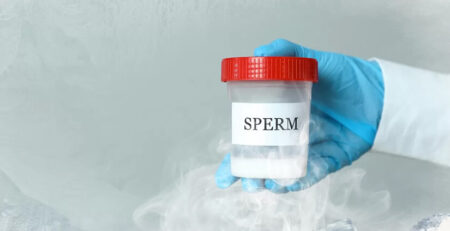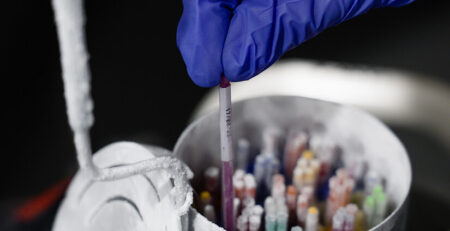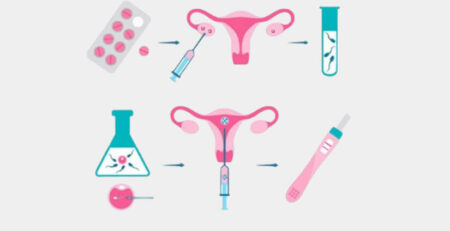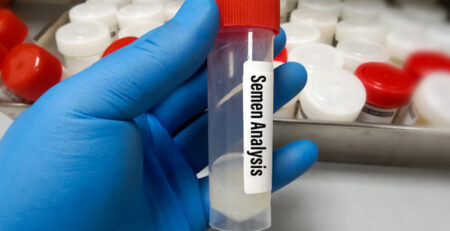Empowering Men on Their Path to Fatherhood!
Male infertility affects a significant portion of couples striving for conception, with male factors contributing to around half of all infertility cases. At Excel IVF, we understand the complexities surrounding male reproductive health and are dedicated to providing advanced, compassionate care to help couples achieve their dreams of parenthood.
Here, we are offering a comprehensive guide on male infertility, outlining its causes, types, diagnosis, and treatment options available at our clinic.
What is Male Infertility?
Male infertility means a man’s inability to cause pregnancy in a fertile female, which can result from various health issues that impair sperm production, function, or delivery. Globally, about 7% of men are affected by infertility. Understanding its causes, recognizing symptoms, and seeking timely medical consultation can significantly enhance the likelihood of conception.
Causes of Male Infertility
Infertility in men can be due to a range of genetic and environmental factors, including:
- Genetic Disorders: Conditions like Klinefelter syndrome or cystic fibrosis gene mutations.
- Lifestyle Factors: Smoking, excessive alcohol consumption, drug use, and obesity.
- Environmental Influences: Exposure to toxins such as pesticides and heavy metals.
- Medical Conditions: Varicocele, infections affecting the testes, and hormonal imbalances.

Types of Male Infertility
Pre-testicular Causes of Male Infertility
These causes are related to factors that do not directly affect the testicles but rather influence the production of sperm by affecting the hormonal environment:
Hormonal Imbalances: Issues with the pituitary gland or hypothalamus can disrupt hormone levels that stimulate sperm production.
Lifestyle and Health: Conditions like diabetes and thyroid problems can interfere with hormonal balances necessary for sperm production.
Testicular Causes of Male Infertility
Male infertility can also be due to a range of medical conditions that can impact a man’s ability to conceive naturally with his partner. This category includes issues directly related to the testicles that impair their ability to produce sperm.
Here are some of the specific medical terms used to describe various conditions related to male infertility:
Azoospermia: In this condition there is a complete absence of sperm in the semen.
Oligospermia: Also known as oligozoospermia, this refers to semen with a low concentration of sperm.
Asthenozoospermia: This condition involves reduced sperm motility, meaning that the sperm do not move effectively, which can cause disturbance in their ability to reach and fertilize an egg.
Teratozoospermia: This is when sperm have abnormal morphology, meaning their shape and size are irregular, which can impair their functionality.
Varicocele: A varicocele is a condition where veins get enlarged within the scrotum. This is among the leading causes of decreased sperm production and decreased sperm quality.
Hypogonadism: This is a condition where the body produces insufficient sex hormones, which can lead to reduced sperm production. Hypogonadism can be classified as either primary (testicular failure) or secondary (failure of the hypothalamus or pituitary gland to produce hormones needed for sperm production).
Retrograde Ejaculation: When after an ejacualtion, the semen enters the bladder instead of exiting through the urethra.
Erectile Dysfunction: A condition when a man is not able to sustain an erection sufficient for sexual intercourse, which can impact the ability to conceive.
Klinefelter Syndrome: A genetic condition where a male is born with an extra X chromosome, which can lead to infertility.
Cryptorchidism: Also known as undescended testicles, this condition occurs when one or both testicles fail to descend from the abdomen into the scrotum.
Sperm DNA Fragmentation: High levels of damaged DNA within sperm that can result from various causes including oxidative stress, and can lead to male infertility.
These conditions can be diagnosed through various tests and assessments, and many of them can be treated medically or surgically, improving the chances of conception.
Post-testicular Causes of Male Infertility
These are factors that affect the male reproductive system after sperm has been produced:
Ejaculatory Issues: Conditions such as retrograde ejaculation, where sperm enters the bladder instead of exiting through the penis during orgasm.
Obstructions: Any blockages in the vas deferens or other tubes that transport sperm can prevent the delivery of sperm to the ejaculate.
How Fertility Preservation Works
Initial Evaluation
When you visit Excel IVF for a fertility assessment, our specialists will conduct a comprehensive initial evaluation. This process begins with a detailed medical history and physical examination. Our specialists will inquire about your health history, including any chronic illnesses, surgeries, medications, and your sexual habits. Lifestyle factors such as diet, exercise, smoking, alcohol use, and exposure to environmental toxins are also discussed, as they can significantly impact fertility.
Key Initial Tests
Semen Analysis: This fundamental test assesses semen volume, sperm concentration, motility (movement), and morphology (shape). A sample of semen is collected and examined under a microscope to evaluate these parameters. It’s often repeated to confirm results due to the variability in sperm production.
Physical Examination: A focused physical exam will be performed, particularly assessing the scrotum and testicles for abnormalities such as varicoceles (enlarged veins in the scrotum), signs of hormonal imbalances like reduced body or facial hair, and other physical cues that could indicate underlying problems.
Embark on Your Journey to Parenthood - Just a Click Away
from Fulfilling Your Miracle Dream
Advanced Diagnostic Tests for Male Infertility
If initial tests show abnormalities, or if the cause of infertility remains unclear, further advanced diagnostic tests are recommended to explore deeper issues:
Hormonal Testing
Blood Tests: These tests are crucial for assessing the levels of several hormones that govern reproductive functions, including testosterone, follicle-stimulating hormone (FSH), luteinizing hormone (LH), and prolactin. Abnormal levels may indicate issues with the hypothalamus, pituitary gland, or testicles that require targeted treatments.
Genetic Tests
Chromosomal Analysis: This test can identify genetic disorders such as Klinefelter syndrome, which involves an extra X chromosome.
Y Chromosome Microdeletion Test: Some men have a deletion in the Y chromosome affecting sperm production. Identifying these deletions helps tailor the treatment approach, particularly in selecting assisted reproductive technologies.
Imaging
Scrotal Ultrasound: This non-invasive test uses high-frequency sound waves to create images of the testicles and scrotum. It’s used to detect abnormalities such as varicoceles, testicular tumors, or other structural anomalies.
Transrectal Ultrasound: If ejaculatory duct obstruction is suspected, this ultrasound examines the prostate and seminal vesicles.
Post-Ejaculation Urinalysis
Retrograde Ejaculation Test: This test involves analysing urine sample after ejaculation to determine if sperm are present in the sample, this indicates that sperm are travelling backward into the bladder instead of going out through the urethra. Medications are often helpful to treat this condition or surgical interventions may be necessary, depending on the severity.
Each of these diagnostic tools provides critical information that helps our fertility specialists develop a personalized treatment plan to overcome infertility challenges. Our comprehensive approach ensures that all potential factors are thoroughly evaluated to give you the best chance of achieving parenthood.
Male Infertility Treatment Options
Medication and Hormonal Treatments
Medications can play a pivotal role in treating some types of male infertility, especially those that occur due to hormonal imbalances or other underlying medical conditions:
Hormone Replacements and Medications: Medicines like hCG or clomiphene can increase the hormone levels necessary for sperm production.
Antibiotics: To treat infections that might be causing infertility, though they aren’t effective for treating sexually transmitted infections (STIs).
Surgical Options
Surgical interventions may be necessary if there are physical blockages or varicoceles:
Varicocelectomy: A procedure to remove enlarged veins in the scrotum.
Vasovasostomy: Reversal of a vasectomy.
Sperm Retrieval Techniques: Used along with IVF or ICSI, these techniques are beneficial when ejaculation is a problem or no sperm are present in the ejaculate.
Assisted Reproductive Technologies (ART)
ARTs are often used when other treatments do not succeed:
Intracytoplasmic Sperm Injection (ICSI): Direct injection of a single sperm into an egg.
IVF: Combining sperm and eggs outside the body in a laboratory dish. If a male factor is the primary issue, ICSI is used with IVF.
Lifestyle and Home Remedies
Improving your overall health can enhance fertility:
Diet and Exercise: Maintain a healthy weight, eat a balanced diet, and exercise regularly.
Avoid Toxins: Limit your exposure to toxins such as pesticides and heavy metals.
Stop Smoking and Limit Alcohol: Smoking can reduce sperm count, and excessive drinking can lower testosterone levels.
Dietary Supplements: As directed by your doctor, taking additional supplements for proteins, iron, multivitamins, etc., can help you improve your vitality and overall physical health.
Coping and Support
Dealing with infertility can be emotionally stressful:
- Counselling: Seek support from a counsellor who specializes in male infertility.
- Support Groups: Connect with others couples facing similar challenges.
- Communication: Maintain open communication with your partner.
The Way Forward
If you are suffering from infertility issues or suspect that you might be, contact us today at Excel IVF to schedule a personal consultation. Our team is ready to provide you with tailored advice, a complete and accurate diagnosis of the condition, and treatment options based on your specific needs.
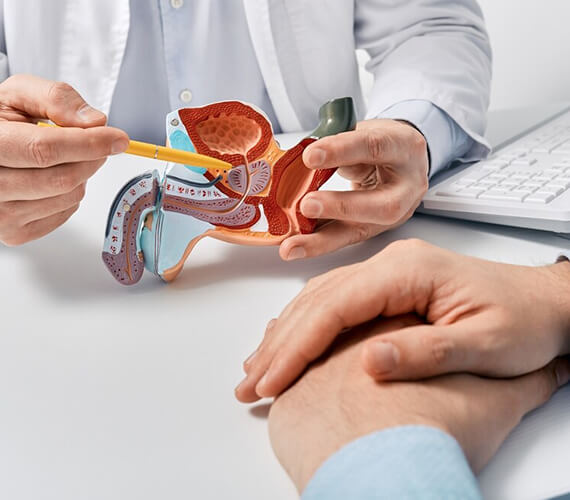
FAQs for Male Infertility
Often, there are no obvious symptoms other than the inability to conceive a child. A reduced sexual function, pain, swelling or a lump in the testicle area, and decreased facial or body hair could suggest hormonal problems.
Couples should consider seeking help after one year of unsuccessful conceiving. If the woman is over 35, the time frame is reduced to six months.
Male infertility impacts approximately 7% of all men. Almost 50 % of infertile couples have male factor infertility.
Lifestyle factors such as maintaining a healthy weight, eating a nutritious diet, exercising regularly, and avoiding toxins may improve fertility. It is always advisable to take a proper treatment approach with a trusted fertility specialist.
The success rate varies based on the underlying cause of infertility and the treatments used. Techniques like IVF and ICSI have significantly improved the chances for many couples.

